Plot summary
The book opens with a gravely injured Peter Karras in a D.C. hospital in 1946. The plot flashes back to Karras and his friends as children in 1933. Karras gets into a fight with a group of African-American boys and his opponent, Junior Oliver, earns his grudging respect. Next the story jumps to 1944 and the Philippines theatre of World War II. Karras kills his first man and one of his childhood friends, Billy Nicodemus, is killed. Next the book returns to 1946 and we learn Karras has married Eleni, and how he came to be injured. Karras flippant attitude upsets his superior Mr. Burke and when Karras fails to collect a debt from another Greek Burke decides to have him punished. He instructs Recevo to betray his friend Karras. Burke dispatches his enforcer Reed to assault Karras after Recevo sets him up. Reed beats Karras with a baseball bat.
When promiscuous Lola disappears in 1948 after moving to Washington her brother Mike Florek decides to search for her. Eventually Florek takes a job at Nick Stefanos' diner in 1949. Karras is now working there as a chef. Jimmy Boyle, now a beat cop, has become peripherally involved in the investigation of the murder of several prostitutes by a serial killer. Karras correctly suspects that Lola has become a prostitute and aids Florek in his search. Lola's madam Lydia is murdered by the killer and Lola witnesses the crime. Boyle locates Lola for Karras and Karras and Florek extract her from Morgan's brothel. Karras lets Florek and Lola leave town.
Burke targets Stefanos' diner for his protection racket. When Stefanos resists Burke hires Bender's outfit to pressure Stefanos and fool him into believing he needs the protection. Karras sees through the scheme and they lure Bender's men into a trap and kill them. After rescuing Lola Karras suspects Gearhart as the murderer from her description. He enlists the help of Joe Recevo who informs Burke of Gearhart's murderous tendencies. Burke confronts Gearhart and begins to organize a cover-up. Recevo informs Jimmy Boyle of Gearhart's involvement and tells him to go to his apartment to retrieve the murder weapon. Burke dispatches Reed on the same mission. When Boyle reaches the apartment he is grievously wounded by Gearhart, who had disobeyed Burke's instructions and returned home. Boyle manages to shoot Gearhart in the struggle.
Burke realizes that Karras is the common-link between Boyle and Gearhart and confronts Recevo. He instructs Recevo to bring Karras to him. Recevo brings Karras in but the two make a last stand together and kill Burke, Reed and many of their men before being shot. The book ends with a coda set in 1959 as Stefanos and Costa visiting Karras' grave.
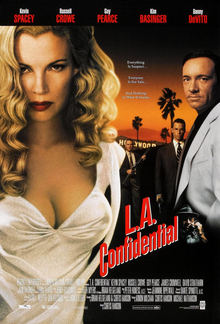
L.A. Confidential is a 1997 American neo-noir crime film directed, produced, and co-written by Curtis Hanson. The screenplay by Hanson and Brian Helgeland is based on James Ellroy's 1990 novel of the same name, the third book in his L.A. Quartet series. The film tells the story of a group of LAPD officers in 1953, and the intersection of police corruption and Hollywood celebrity. The title refers to the 1950s scandal magazine Confidential, portrayed in the film as Hush-Hush.

Lee Earle "James" Ellroy is an American crime fiction writer and essayist. Ellroy has become known for a telegrammatic prose style in his most recent work, wherein he frequently omits connecting words and uses only short, staccato sentences, and in particular for the novels The Black Dahlia (1987) and L.A. Confidential (1990).

The Black Dahlia (1987) is a crime fiction novel by American author James Ellroy. Its subject is the 1947 murder of Elizabeth Short in Los Angeles, California, which received wide attention because her corpse was horrifically mutilated and discarded in an empty residential lot. The investigation ultimately led to a broad police corruption scandal. While rooted in the facts of the Short murder and featuring many real-life people, places and events, Ellroy's novel blends facts and fiction, most notably in providing a solution to the crime when in reality it has never been solved. James Ellroy dedicated The Black Dahlia, "To Geneva Hilliker Ellroy 1915-1958 Mother: Twenty-nine Years Later, This Valediction in Blood." The epigraph for The Black Dahlia is "Now I fold you down, my drunkard, my navigator, My first lost keeper, to love and look at later. -Anne Sexton."

Mystic River is a 2003 American neo-noir crime drama film directed and co-produced by Clint Eastwood, and starring Sean Penn, Tim Robbins, Kevin Bacon, Laurence Fishburne, Marcia Gay Harden and Laura Linney. The screenplay, written by Brian Helgeland, was based on the 2001 novel of the same name by Dennis Lehane. It is the first film in which Eastwood was credited as composer of the score.

Peter Lawrence Boyle was an American actor. Known as a character actor, he played Frank Barone on the CBS sitcom Everybody Loves Raymond and the comical monster in Mel Brooks' film spoof Young Frankenstein (1974). He also starred in The Candidate (1972). Boyle, who won an Emmy Award in 1996 for a guest-starring role on the Fox science-fiction drama The X-Files, won praise in both comedic and dramatic parts following his breakthrough performance in the 1970 film Joe, and as Wizard in Taxi Driver (1976).

George P. Pelecanos is an American author. Many of his 20 books are in the genre of detective fiction and set primarily in his hometown of Washington, D.C. He is also a film and television producer and a television writer. On television, he frequently collaborates with David Simon, writing multiple episodes of Simon's HBO series The Wire and Treme, and is also the co-creator of the HBO series The Deuce and We Own This City.
Family Values is a graphic novel, and the fifth "yarn" in Frank Miller's Sin City series. It was first published in October 1997. Unlike the previous four stories, Family Values was released as a 128-page graphic novel rather than in serialized issues that would later be collected in a trade paperback volume.
Rosie Lee Reed, better known as Pearl Starr, was an American bordello owner and businesswoman in Arkansas, the first child of Belle Starr, the reputed "Bandit Queen" of the American Old West. Her father was either Jim Reed, Belle's first husband, or Cole Younger, a famous outlaw associated with the James–Younger Gang.
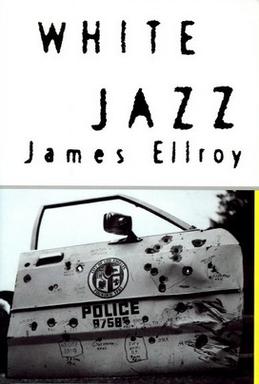
White Jazz is a 1992 crime fiction novel by James Ellroy. It is the fourth in his L.A. Quartet, preceded by The Black Dahlia, The Big Nowhere, and L.A. Confidential. James Ellroy dedicated White Jazz "TO Helen Knode." The epigraph for White Jazz is "'In the end I possess my birthplace and I am possessed by its language.' -Ross MacDonald."

Father Damien Karras, SJ, is a fictional character from the 1971 novel The Exorcist and its 1983 sequel Legion. He is one of the main protagonists in the 1973 film The Exorcist and a supporting character in the 1990 film The Exorcist III, an adaptation of Legion. The character is portrayed by Jason Miller.

Resurrection Men is a 2002 novel by Ian Rankin. It is the thirteenth of the Inspector Rebus novels. It won the Edgar Award for Best Novel in 2004.
The L.A. Quartet is a sequence of four crime fiction novels by James Ellroy set in the late 1940s through the late 1950s in Los Angeles. They are:
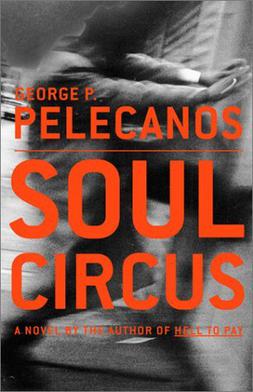
Soul Circus is a 2003 crime novel by George Pelecanos. It is set in Washington DC and focuses on private investigators Derek Strange and Terry Quinn. The title refers to dialogue from within the novel where two young drug dealers discuss their lives. It is the third novel to involve Strange and Quinn, following Right as Rain (2001) and Hell to Pay (2002).

The Night Gardener is a 2006 crime novel by George Pelecanos. It is set in Washington, DC and focuses on homicide detective Gus Ramone, and ex-cops Dan "Doc" Holiday and TC Cook as they investigate the possible return of a serial killer.
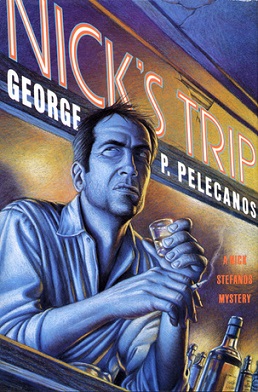
Nick's Trip is a 1993 crime novel from author George Pelecanos. It is set in Washington D.C. and focuses on bartender Nick Stefanos as he investigates the disappearance of an old friend's wife and the murder of another friend. It is the second of several Pelecanos novels to feature the character and the second book of a trilogy with Stefanos as the main character. The preceding book in this series is A Firing Offense and the series concludes with Down by the River Where the Dead Men Go.

James Michael Burke was an Irish-American film and television character actor born in New York City.
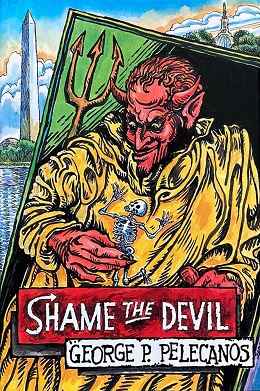
Shame the Devil is a 1999 crime novel written by George Pelecanos. It is set in Washington DC and focuses on a botched robbery and its consequences. It is the last of four books comprising the D.C. Quartet. The other books in this series are The Big Blowdown, King Suckerman, and The Sweet Forever.
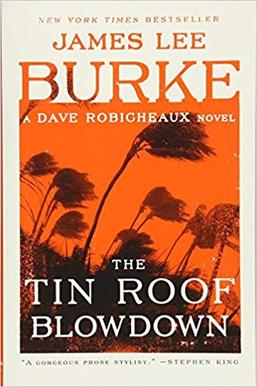
The Tin Roof Blowdown (2007) is a crime novel by American author James Lee Burke.
The Maltese Falcon Society is an organization for admirers of Dashiell Hammett, his 1930 novel The Maltese Falcon, and hardboiled mystery books and writers in general. Founded in San Francisco in 1981, the organization is no longer active in the United States; however, a chapter in Japan has been active continuously since 1982. The Japanese branch of the society presents the Falcon Award, Japan's highest honor in the mystery field, to honor the best hardboiled mystery novel published in Japan.
Brenda Allen was a madam based in Los Angeles, California, whose arrest in 1948 triggered a scandal that led to the attempted reform of the Los Angeles Police Department (L.A.P.D.). Allen received police protection due to her relationship with Sergeant Elmer V. Jackson of the L.A.P.D.'s administrative vice squad, who reportedly was her lover.















